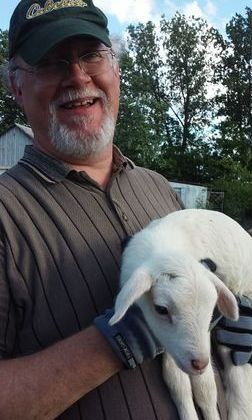St Croix
Valuable homestead sheep
The meat of the St. Croix is mild and lean. Even aged ewes provide juicy, tasty roasts with no strong 'mutton' flavor.
St. Croix hair sheep have been found through university and Ag research to have a strong ability to resist parasite life cycles.
It is recommended that worming medicines be given only if there is a loss of body condition.
They are also hoof rot resistant, and often do not need trimming in dry conditions.
St. Croix shed their wool - no shearing required!
Because of their ability to shed their wool, there is less likelihood of fly-strike and tails do not need to be docked.
Both rams and ewes are naturally polled.
They thrive in varying climates, being found in most areas of the United States.
St. Croix hair sheep often have triplets and occasionally quadruplets. Ewes average 2.1 births per lambing. Because of their high milk production, they often are able to raise even quads without supplementation.
Good milk production makes them popular for cheese production.
St. Croix also ovulate year-round, allowing for much flexibility in lambing seasons. It is not uncommon to have two lamb crops a year; three in 18 months are possible.
St. Croix ewes are excellent attentive mothers, giving close attention to their lambs and bonding well quickly.
St. Croix ram lambs reaching sexual maturity as early as 3 months of age Separation from their mothers is recommended soon after 60 days of age to prevent accidental breeding of mother/son. First estrus cycle in ewe lambs usually occur at 7-8 months.
Ewes can easily be bred to have their first lambing at a year old.
St. Croix are commonly known to be easy birthers.
St. Croix have a strong flocking instinct. They are active but not flighty and are a popular choice for training herd dogs and in sheep dog trials.
St. Croix both graze and browse; utilizing weeds and coarse fodder better than other sheep breeds.
They have been used in weed control programs.
St. Croix hair sheep are docile and easy to handle. They are popular with homestead farmers, older farmers, and families with children. Livestock guardian dogs are frequently utilized with the St. Croix. The flock tends to respond well to the dogs. Llamas or donkeys also may be used to protect the St. Croix flock.
We have found the St. Croix Hair Sheep to be easy keepers, easy to handle and a joy to interact with!
Fabulous meat for the family makes it a plus all the way around.
St. Croix hair sheep have been found through university and Ag research to have a strong ability to resist parasite life cycles.
It is recommended that worming medicines be given only if there is a loss of body condition.
They are also hoof rot resistant, and often do not need trimming in dry conditions.
St. Croix shed their wool - no shearing required!
Because of their ability to shed their wool, there is less likelihood of fly-strike and tails do not need to be docked.
Both rams and ewes are naturally polled.
They thrive in varying climates, being found in most areas of the United States.
St. Croix hair sheep often have triplets and occasionally quadruplets. Ewes average 2.1 births per lambing. Because of their high milk production, they often are able to raise even quads without supplementation.
Good milk production makes them popular for cheese production.
St. Croix also ovulate year-round, allowing for much flexibility in lambing seasons. It is not uncommon to have two lamb crops a year; three in 18 months are possible.
St. Croix ewes are excellent attentive mothers, giving close attention to their lambs and bonding well quickly.
St. Croix ram lambs reaching sexual maturity as early as 3 months of age Separation from their mothers is recommended soon after 60 days of age to prevent accidental breeding of mother/son. First estrus cycle in ewe lambs usually occur at 7-8 months.
Ewes can easily be bred to have their first lambing at a year old.
St. Croix are commonly known to be easy birthers.
St. Croix have a strong flocking instinct. They are active but not flighty and are a popular choice for training herd dogs and in sheep dog trials.
St. Croix both graze and browse; utilizing weeds and coarse fodder better than other sheep breeds.
They have been used in weed control programs.
St. Croix hair sheep are docile and easy to handle. They are popular with homestead farmers, older farmers, and families with children. Livestock guardian dogs are frequently utilized with the St. Croix. The flock tends to respond well to the dogs. Llamas or donkeys also may be used to protect the St. Croix flock.
We have found the St. Croix Hair Sheep to be easy keepers, easy to handle and a joy to interact with!
Fabulous meat for the family makes it a plus all the way around.
Friday, June 26, 2020



